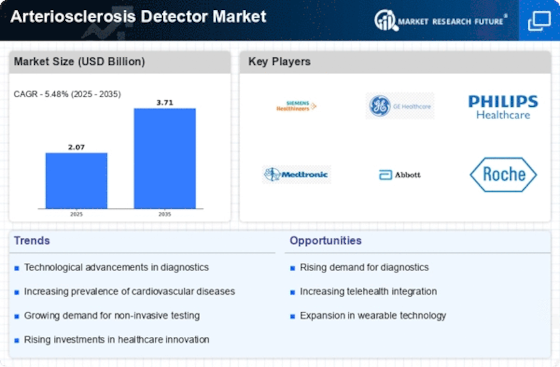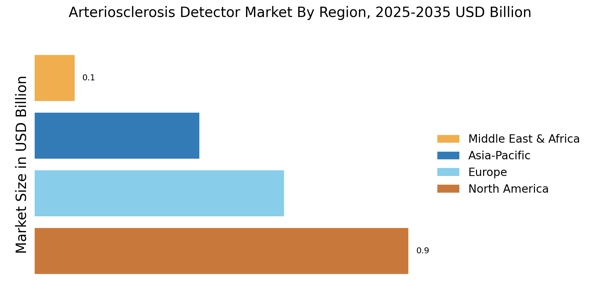Growing Awareness of Preventive Healthcare
The rising awareness of preventive healthcare is significantly influencing the Arteriosclerosis Detector Market. As individuals become more informed about the risks associated with cardiovascular diseases, there is a growing inclination towards regular health screenings and early detection. This shift in consumer behavior is driving demand for arteriosclerosis detectors, as they are essential for identifying potential health issues before they escalate. Educational campaigns and health initiatives aimed at promoting cardiovascular health are further fueling this trend. Consequently, the market for arteriosclerosis detection devices is expected to experience robust growth as more individuals seek proactive measures to manage their health.
Rising Prevalence of Cardiovascular Diseases
The increasing incidence of cardiovascular diseases is a primary driver for the Arteriosclerosis Detector Market. As populations age and lifestyle-related health issues become more prevalent, the demand for early detection tools intensifies. According to health statistics, cardiovascular diseases account for a significant portion of global mortality rates, prompting healthcare systems to prioritize preventive measures. This trend is likely to bolster the market for arteriosclerosis detectors, as they play a crucial role in identifying arterial blockages and other related conditions. The emphasis on early diagnosis is expected to lead to a surge in the adoption of these devices, thereby enhancing the overall growth of the arteriosclerosis detector market.
Technological Innovations in Detection Devices
Technological advancements are reshaping the Arteriosclerosis Detector Market, leading to the development of more accurate and efficient detection devices. Innovations such as non-invasive imaging techniques and advanced biomarker analysis are enhancing the capabilities of arteriosclerosis detectors. These technologies not only improve diagnostic accuracy but also reduce the time required for testing, making them more appealing to healthcare providers. The integration of smart technologies, such as mobile health applications, is also facilitating real-time monitoring of patients' cardiovascular health. As these innovations continue to evolve, they are expected to drive market growth by attracting both healthcare professionals and patients seeking reliable detection methods.
Regulatory Support for Advanced Diagnostic Tools
Regulatory bodies are increasingly supporting the development and approval of advanced diagnostic tools, which is a key driver for the Arteriosclerosis Detector Market. Streamlined approval processes and favorable regulations are encouraging manufacturers to innovate and bring new detection devices to market. This regulatory support not only enhances the availability of arteriosclerosis detectors but also instills confidence among healthcare providers regarding their efficacy and safety. As a result, the market is likely to witness an influx of new products, catering to diverse patient needs and preferences. This trend is expected to stimulate competition among manufacturers, ultimately benefiting consumers through improved options and pricing.
Increased Investment in Healthcare Infrastructure
Investment in healthcare infrastructure is a significant driver for the Arteriosclerosis Detector Market. Governments and private entities are increasingly allocating funds to enhance healthcare facilities, particularly in developing regions. This investment is aimed at improving diagnostic capabilities and expanding access to advanced medical technologies, including arteriosclerosis detectors. As healthcare systems modernize, the demand for effective diagnostic tools is likely to rise, fostering market growth. Furthermore, the establishment of specialized cardiovascular clinics and diagnostic centers is expected to create additional opportunities for the adoption of arteriosclerosis detection devices, thereby contributing to the overall expansion of the market.

















